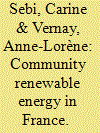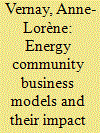| Srl | Item |
| 1 |
ID:
177124


|
|
|
|
|
| Summary/Abstract |
Citizens can take an active part in the energy transition by participating in community renewable energy projects (CREPs). CREPs are emerging in France but their growth is simultaneously rapid and fragile. This paper describes the ongoing CRE movement in France based on an in-depth analysis at both the national and regional levels. To embrace the diversity of initiatives that exist, the paper proposes a typology of CREPs based on governance type and project size. We discuss the institutional, market, organisational and behavioural barriers that CREPs face. We also posit three enabling factors—financial, network and local capacity builders—and show that these factors contribute to explaining observed geographical disparities. We argue that policymakers should recognize the plural role that CREPs can play locally and develop support schemes that reflect this plurality instead of pushing for ever-bigger projects. Finally, because CREPs are not able to meet the growing demand for locally sourced renewable energy, we posit that regulations should evolve to offer CREP participants the opportunity to consume CRE-generated energy and to directly link that consumption to their own energy bills.
|
|
|
|
|
|
|
|
|
|
|
|
|
|
|
|
| 2 |
ID:
191263


|
|
|
|
|
| Summary/Abstract |
The need to accelerate the decarbonisation of the energy system has led to renewed interest in energy communities. Such communities are now identified by institutions as new instruments that can contribute to four main policy objectives: i) increase renewable energy capacity, ii) mobilize private capital, iii) provide flexibility for the electricity system, and iv) empower consumers. Within the frame of the historically centralised French energy system, we present five energy community business models (ECBMs) and explore the extent to which they contribute to the four aforementioned policy objectives. Our analysis shows that, while no ECBM has yet enhanced the flexibility of the grid, each ECBM contributes differently to realising three other policy objectives. We also show that the diffusion of ECBMs remains limited as a result of legal, organisational and financial barriers. We propose three recommendations that could help ECBM diffuse – protect economic viability, support intermediaries that facilitate the adoption of ECBMs, and nurture local governments as key enablers. Our outcomes are intended to guide policymakers by providing insights into which types of energy communities could contribute most significantly to the various policy objectives and provide recommendations to include them in their energy policy roadmaps more effectively.
|
|
|
|
|
|
|
|
|
|
|
|
|
|
|
|
| 3 |
ID:
190608


|
|
|
|
|
| Summary/Abstract |
Although growing in number, the contribution of Community Renewable Energy (CRE) organizations to the Grand Challenge of energy transition remains small in volume. Scholars have attempted to explain and understand why CRE organization may not want or be able to scale up and highlighted the role of both exogenous and endogenous factors. This paper contributes to this work by analysing how organizational identity (OI) influences CRE organizations’ scaling strategy. Building on both OI literature and institutional logic literature, we formulate hypotheses about the relationships between OI and scaling strategies. To test these hypotheses, we conducted a survey among members of French CRE organizations. Results provide evidence that there is a high consensus among CRE members about what CRE OI is and that few members aspire their organization to change. We also show that a limited membership base would prioritize scaling strategies that are likely to increase institutional complexity. We summarize these results by arguing that French CRE organizations are facing an identity trap that limits their scaling potential. We discuss how CRE organization could escape this identity trap. Above its contribution to current scholarly debates on CRE organizations scaling potential, this research has implications for policy makers and CRE organizations.
|
|
|
|
|
|
|
|
|
|
|
|
|
|
|
|